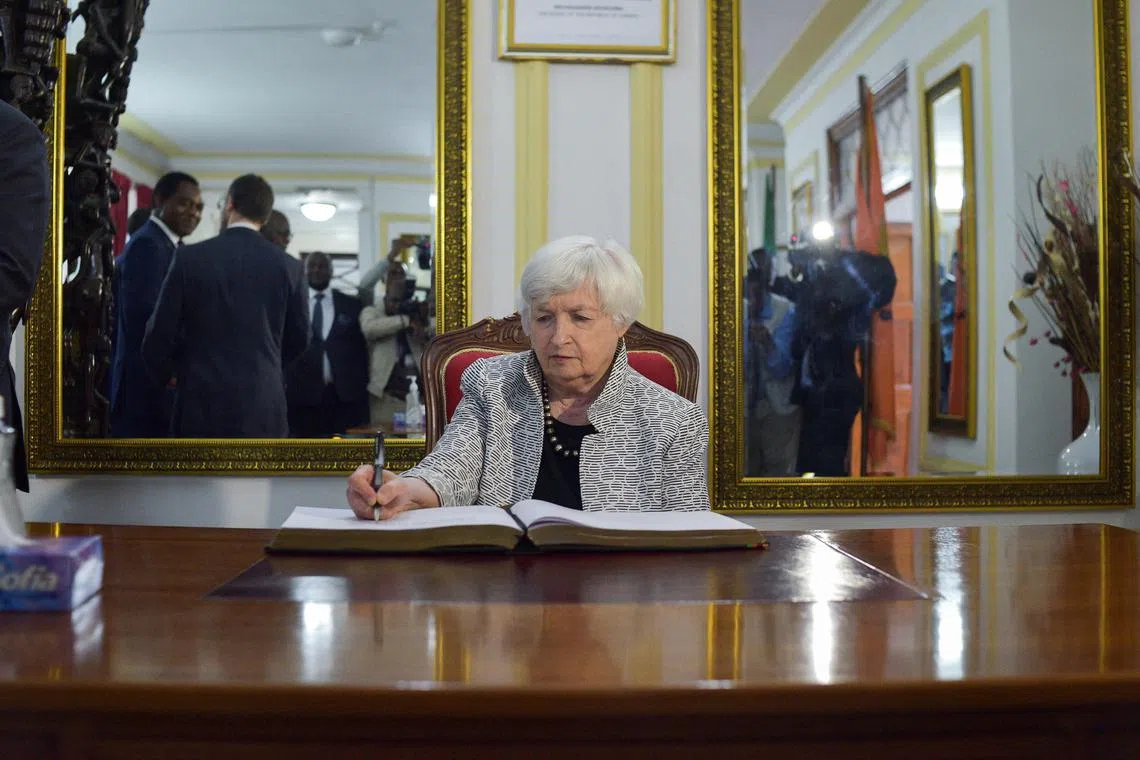As Yellen woos Africa, sceptics ask: Is the US here to stay?
Sign up now: Get ST's newsletters delivered to your inbox

US Treasury Secretary Janet Yellen, seen here in Zambia, is on a three-country trip to assure Africa the US remains engaged.
PHOTO: REUTERS
LUSAKA, Zambia - US Treasury Secretary Janet Yellen’s three-country trip to Africa - the leading edge of a new diplomatic push by the Biden administration - aims to show the continent that the United States is a true partner, one here for the long-haul.
But after decades of losing ground to China and the tumult of the Donald Trump years, when the former president threatened to slash aid and roll back military support, it is a tough sell.
As Africa struggles with economic headwinds caused by the Covid-19 pandemic, the war in Ukraine and, notably, Washington’s own monetary policy, Africans are asking for proof the US will stay the course this time.
Dr Yellen, so far, is at pains to make guarantees.
“I don’t know how I can give assurances, honestly,” she told Reuters in an interview en route from Senegal to Zambia. But Republicans and Democrats alike support longstanding initiatives, including in the areas of health and trade, she said.
Dr Yellen’s trip kicks off a year of high-level US visits that will include President Joe Biden, Vice-President Kamala Harris, Trade Representative Katherine Tai and Commerce Secretary Gina Raimondo.
Washington hosted African leaders from 49 countries and the African Union at a summit in December, where Mr Biden said the US was “all in” on Africa’s future and planned to commit US$55 billion (S$72 billion) over the next three years.
African officials have broadly welcomed the US’ renewed engagement. But the timing, two years into Mr Biden’s four-year term, is viewed by many as “late and somewhat half-hearted”, said Mr Chris Ogunmodede, a Nigerian researcher and associate editor of World Politics Review.
“The fears that Biden will not follow through, or that he could lose and be replaced by a hostile Republican administration, definitely exist,” he said.
China, debt and rate hikes
As the US touts its longstanding ties to Africa and a renewed commitment to ramping up trade and investment, it’s playing catch-up with China and facing a growing challenge from Russia.
Chinese trade with Africa is about four times that of the US, and Beijing has also become an important creditor by offering cheaper loans than Western lenders.
American officials - both Democrats and Republicans - have criticised China’s lending as lacking transparency and predatory.
In Senegal, Dr Yellen warned Africa against “shiny deals that may be opaque and ultimately fail to actually benefit the people” and has accused China of dragging its feet on a critical debt restructuring in Zambia.
But US fiscal policy is creating its own drag.
African countries have become collateral victims of 2023’s rate hikes by the US Federal Reserve, aimed at curbing inflation at home.
“Tightening financial conditions and the appreciating US dollar have had dire consequences for most African economies,” the African Development Bank (AfDB) wrote in a report last week.
The cost of debt service is expected to hit US$25 billion in 2024 according to the World Bank, up from US$21.4 billion in 2022. In local currency term, it’s risen even faster, increasing the risk of debt distress, the AfDB stated.
African countries are also finding it harder to access capital markets to meet their fiscal needs and refinance maturing debt.
The US, meanwhile, has largely failed to offer viable alternatives to cheap Chinese credit, officials said.
“China is an important partner,” Democratic Republic of Congo Finance Minister Nicolas Kazadi told Reuters. “It is clearly shown that it’s not easy to mobilise US investors.” REUTERS


